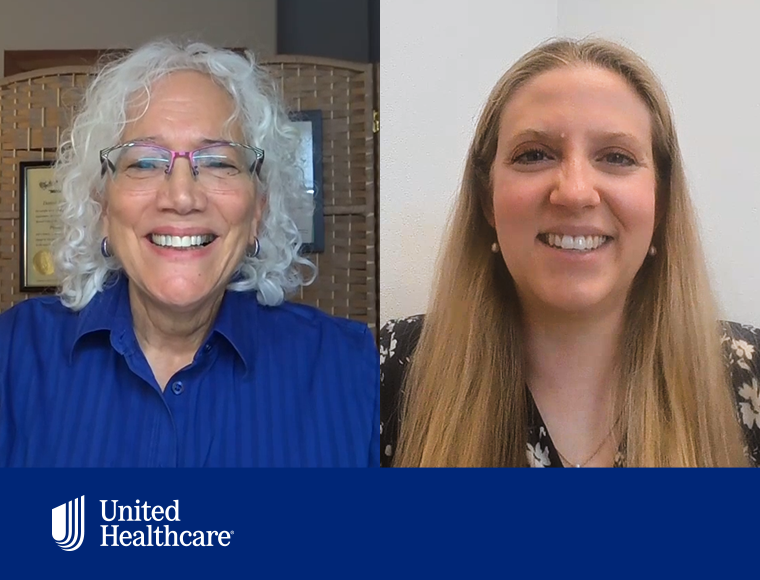Davinah Simmons is Associate Director, Maternity Provider Partnerships Strategy and Nicole Truhe is Senior Director of Medicaid Policy.
The estimated national maternity mortality rate in the United States is about 17 per 100,000 live births and it is approximately 43 per 100,000 live births for individuals who are Black1. Integrating doulas into the care team benefits pregnant individuals, as they can help address these adverse health outcomes through the entire perinatal journey (pregnancy, birth, postpartum). Doulas assist with ensuring that pregnant Individuals have access to evidence-based information to understand their options to support conversations and collaboration with their OB or Midwife. The role of a doula covers an array of knowledge and training related to the perinatal experience. Some are trained in any/all areas of fertility, birth, postpartum, and bereavement/grief. Doulas are formally trained or have direct-lived experience that translates to the care they offer.
Doulas throughout the birthing process
Giving birth is a transformational moment for both the pregnant individual and the infant. The outcome of a birth on a physiological level has far reaching impact on the dyad of birthing parent/infant. Doulas have the opportunity to step into a unique position as a confidant and advocate to support pregnant individuals by focusing first on creating a personal connection with the client and secondly, by helping to prepare them for the demands of the postpartum journey. The relationship doulas have with clients extends itself far beyond the birthing and postpartum time since clients have trusted their doula to witness the most significant experiences of their lives.
Living directly in and among the community that we support, doulas have a pulse on community needs and offerings, an awareness of birth culture specific to that geographic area and can inform families on how to prepare for their birthing time depending on where they choose to birth. This preparation also includes addressing anxieties about birth, providing information about the physiological process that birth is, and when the time comes offering physical, emotional, and logistical support during labor until an infant makes their entrance into the world.
Doulas operate under the saying "If you don't know your options, you don't have any." They can help decipher medical jargon into plain language and ultimately amplify the birthing person's voice to support their needs around pain management, birthing options, and ensuring they are being heard and respected.
Doulas also specialize in connecting their clients to any needed community services prenatally or postpartum. Services can include postpartum support groups, infant supplies, bodywork (pelvic floor therapy, massage therapy, acupuncture), and lactation support to name a few. When people have a positive birth experience and know where to get support during the immediate postpartum stage, their journey into parenting begins with a stronger foundation.
With a trusting relationship and their connections throughout the community, doulas help open the door to the full spectrum of reproductive care — leading to quality improvement of physical and mental health outcomes for pregnant individuals and better outcomes for infants.
Doula Care covered as a Medicaid benefit — why needed?
As Medicaid members often have deeper, complex needs, doulas recognize what stigmas exist for this population and work to ensure that there are no gaps in the quality of care that they receive in every part of the perinatal journey.
Doula care has led to improved health care outcomes, such as 28% fewer C-sections, a 9% decrease in the use of pain medication, and reduction in maternal mortality in Black, Indigenous, People of Color (BIPOC) communities. In addition, one study highlighted that doula care in a Medicaid population helped increase breastfeeding by more than 17% overall, and more than 21% for birthing people who are Black2. Integrating doulas into maternity care teams can help overcome mistrust within the health care system and can increase engagement in the birthing process.
Medicaid provides a base of coverage for pregnant individuals and children whose incomes are below the federal poverty threshold. In 2018, Medicaid covered 45% of all births nationally3. This includes a greater number of births in rural areas and among BIPOC individuals. Maternal mortality rates are on the rise with significant racial, ethnic, and socioeconomic disparities influencing birth outcomes. Studies have shown that doula care improves maternal and infant health outcomes, and that Medicaid reimbursement of doula services can achieve cost savings while providing a sustainable, living wage for doulas.
Doula coverage is a growing Medicaid benefit being adopted in new states each year. Over a dozen states recently introduced legislation or successfully passed legislation and are now pursuing federal approval to use Medicaid funding to support doula care.
How Doula Care can help pregnant individuals now
Doula care was born out of culturally attuned, community care. It has meant that no one births or begins their parenting journey alone. Doulas have on the ground experience in helping health care organizations and professionals understand the barriers that pregnant populations face. Doula care instills confidence in pregnant people and new parents, improving satisfaction with the birthing and postpartum experience. With this continuous support, evidence shows that rates of depression, anxiety and suicide within the first year of an infant's life can also be reduced. Everyone is deserving of doula support, whether they have insurance coverage or not. In recognizing this and supporting the integrity of the work that doulas offer within their communities, we see the benefits contributing to the fabric of a resilient and thriving community.
Sources
- Products - Health E Stats - Maternal Mortality Rates in the United States, 2019
- Doula Care Now Covered by Medicaid in Several States
- Medicaid After Pregnancy: State-Level Implications of Extending Postpartum Coverage | ASPE









